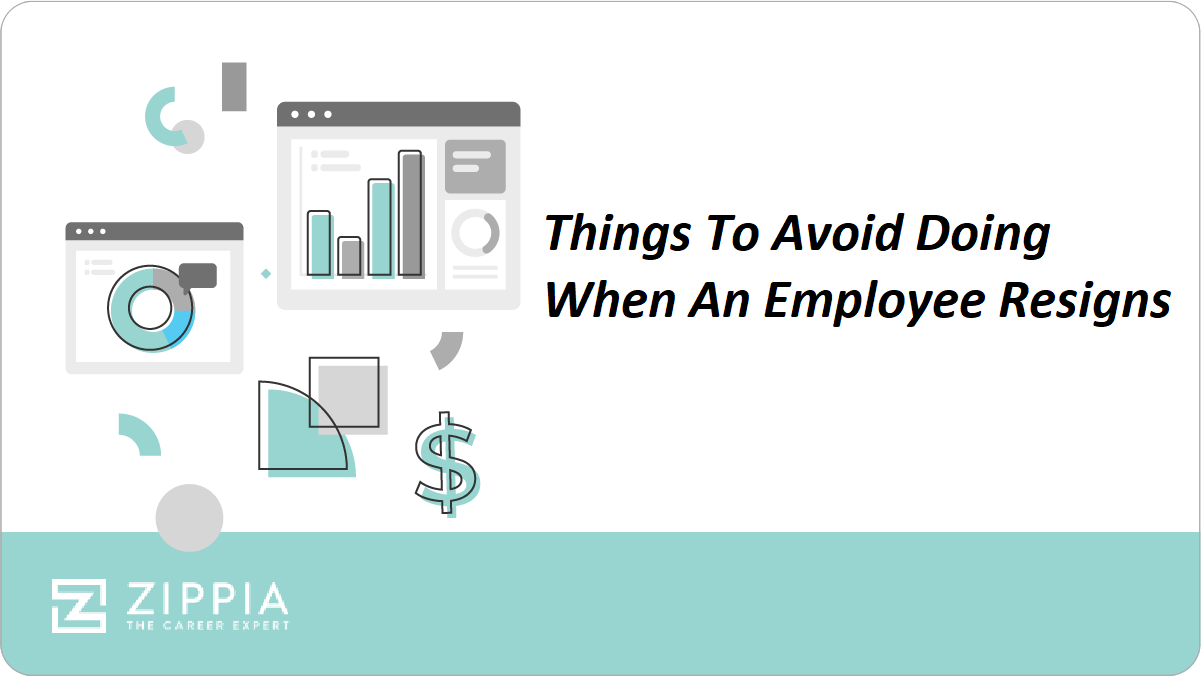Many employers have been there. Everything at the office is going great and everyone seems to be happy. Your team is performing superbly and the latest project is nothing but a piece of cake for them. They communicate, delegate, collaborate, and do everything the company needs.
And then, all of a sudden one of your high-performing employees asks to have a conversation in your office. Given that everything is going smoothly, you don’t suspect anything. However, as the employee comes to your office, they close the door and tell you that they want to leave the company.
Handing the employees resignation can affect team morale as well as team performance. Even though many resignations are typically unpredictable, there are a number of strategies you should keep in mind to prevent the negative implications of the loss.
Key Takeaways:
-
Listen to why the employee is leaving and react empathetically to their reasons – then use that information to improve your team for the future.
-
Thank the employee for their work and offer to stay in touch with them as a possible business partner or coworker in the future.
-
Try to be prepared for unexpected resignations and handle transitions with as little disruption to the team as possible.
10 Ways To Handle Employee Resignations
-
Be a good listener. You may be tempted to say many things when an employee announces this news. However, you should try your best to listen and understand why he or she is leaving. By listening closely, you may discover some perceived disadvantages of working for your company.
For example, if an employee says that an uncompetitive compensation package is the main reason for leaving, review and analyze whether the company provides a reasonable salary. Next, if the reason is a lack of professional growth opportunities, you may ask yourself whether your company does, in fact, provide enough of them. As a result, you may start noticing the signs of unhappy employees.
-
Control your reaction. The way you react to their decision to leave could well define how your employee will decide to spend their last days working in your company. For example, if your reaction is negative, the employee may choose to respond with a similar attitude. As a result, he or she may spend their final days not doing much.
To avoid that, you can replace anger with empathy. Just imagine how difficult it is for the employee to share this news with you. Be an empathetic leader and help make it easier for them by showing understanding and a positive attitude.
-
Attempt to negotiate (if necessary). An unexpected resignation can provide a negative impact on a team but when it happens a week out from delivering an important project, things could get ugly. As the project leader, you know if a key member quits, there’s simply no time to replace them and deliver the project as planned. Moreover, the cost of replacing that employee is very high.
If the project is at a critical point and the stakes are high, it is reasonable negotiate. For example, you could ask them to stay at least one more week or until the end of the project.
-
You could try to explain that resigning at such a critical stage could seriously damage their reputation. If a future employer were to learn that they have a history of leaving at critical moments, they may not consider them as a suitable candidate for a position in their company.
-
Let that person know that it’s impossible to find another qualified person quickly and deliver the project in time. If they have already found a new position, ask them to stay for one more week.
-
-
Make the resignation formal. Make sure that you request a formal letter that include their final date of employment. If they verbally told you their resignation, make sure you ask that they give you a written resignation letter to help protect your business from unemployment claims and other charges of impropriety.
-
Create a transition plan. Having a smooth transition after an employee leave is important. This will help eliminate any issues for the employee that is leaving, and for the remaining staff. Some steps that you should include in this prosses include:
-
Ask the employee to write a list of all the responsibilities and tasks that they are handle on a daily basis.
-
Ask them about the projects that they are currently working on and any loose ends that need to be tied up.
-
Determine if the role needs to be filled immediately or if the work can be split between the remaining staff.
-
Ask if they are able to help train a new hire if hired before they leave.
-
-
Notify other employees. After your employee tells you of their resignation, find out if they have told any other employees and if they would like to make an official announcement. Notifying other employees that worked close with the individual will need to happen sooner or later. To help avoid any rumors, it’s best to be upfront right away.
You should also notify any customers or clients that the employee had contact with them and let them know which employee will be handling their account from now on. Ask them if they have any questions or concerns about this and you will help to resolve it the best that you can.
-
Make sure your message to the team is consistent. To help avoid any gossip or rumors, you should make sure everyone gets the same message. Make it clear as to why the person is leaving. If anyone is absent during this time, make sure to contact them via email or text and let them know.
-
Praise the former employee. After you share the news with the rest of team and you’ve also communicated the news to customers, you should take some time to appreciate the work of the departing employee. Of course, it depends on how long they worked in the company. For example, if the employee had long tenure, many of their colleagues will most likely want an opportunity to say goodbye.
You may want to organize a small farewell party in the office. Nothing big and fancy, just a gathering of people where everyone can wish all the best to the former colleague. They will certainly appreciate it.
-
Stay in touch. After the employee has left your team, you should try to stay in touch with them. It makes strong business sense because this employee could potentially become a future business partner. Moreover, their perception of you as a good leader will only strengthen.
Another thing to do is ask them if they need a reference and offer yourself. This will help them feel as if you valued them as an employee and want to see them have a successful future. It will also help strengthen your professional relationship with them.
-
Reevaluate your risk management plan. Every manager should have a plan that outlines the actions in case an unexpected event like a resignation occurs. If you are facing the same issue and have limited options, it is a good idea to establish such protocol. For example, you can change your recruitment process to ensure that there is always someone else on the team that can perform the duties of a leaving member.
Managing resignations can be daunting, so your task is to make it as painless as possible. Remember to stay positive and always have a back-up plan because otherwise even one resignation could be destructive for your team.
Common Reasons Employees Resign
-
Low salary. Salary and benefits are a big factor with having an employee stay at a job or if they need to find a new one. An employee may love the work and everyone at the company, but if they have a low salary that is not covering their expenses, they will need to make that up elsewhere.
-
Lack of flexibility. Companies that give their employees flexibility with their schedules tend to have happier employees and they have higher retention rates. When employers lack flexibility their employees suffer in their personal lives creative a negative work-life balance which leads to them quitting.
-
Feeling underutilized/undervalued. Without praise and recognition for their work, employees tend to feel undervalued. They often start to question if their work even matters and they will look for other companies that will value them.
This also goes for feeling underutilized. If their skill set is not being used the way it is supposed to, they will wonder why they even have the job.
-
Lack of advancement opportunities. Without advancement opportunities and growing in their professional career, employees will often resent their job. Investing in your employees will often have them staying with the company longer.
-
Problems with management. If managers micromanager or they have a negative attitude towards employees, it will cause issues. Employees don’t want to feel like they have to tiptoe around management to get their work done.




